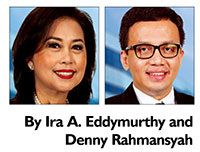 Restrictions on foreign shareholders in Indonesia are set out in the most recent Negative Investment List, contained in Presidential Regulation No. 39 of 2014, outlining the list of business fields that are closed and business fields that are open with requirements for investment (PR 39). PR 39 lists those areas in which investment by both Indonesians and foreigners is prohibited or restricted. In addition to PR 39, the laws and regulations governing the conduct of a certain line of business must be reviewed to determine whether that line of business is open to foreign investment and, if so, whether a limited liability company (Perseroan Terbatas (PT)) with foreign ownership (PT PMA) established to conduct that line of business can be wholly foreign-owned or only partially foreign-owned. If a particular line of business is not listed in PR 39, then it is open to 100 percent foreign investment without condition. The Negative Investment List also stipulates foreign ownership restrictions, for instance, the maximum foreign shareholding, the requirement to partner with a small or medium-scale enterprise and so on. In practice, investors still need to confirm with the Capital Investment Coordinating Board whether a certain line of business is open for 100 percent foreign investment without any condition. The Negative Investment List is organised by reference to the business activities described in the Indonesian business fields classification issued by Indonesia’s central statistics body. A PT PMA may have more than one business field classification number as its line of business unless the relevant laws and regulations provide otherwise. Exchange control or currency regulations The recently issued Bank Indonesia Regulation No. 17/3/PBI/2015 regarding Mandatory Use of Rupiah within the Republic of Indonesia (BI Reg. 17) stipulates the mandatory use of rupiah for:
The obligation to use rupiah for the foregoing applies to cash transactions made as of March 31, 2015 and non-cash transaction made as of July 1, 2015. Certain transactions are exempted from the mandatory use of rupiah as set out under BI Reg. 17. Restrictions on foreign ownership of real estate
The second broad category of land titles encompasses secondary titles, which are titles granted by holders of primary titles on the basis of private agreements, which consist of:
A secondary title is obtained by an investor based on an agreement whereby a primary titleholder grants a legal interest or secondary title to another party. An Indonesian individual is entitled to all primary titles as listed above. A PT PMA is entitled to a right to build or a right of title use. An individual foreigner is only entitled to a right of title use as long as he is a resident of Indonesia. |
SSEK Legal Consultants
14th Floor, Mayapada Tower
Jl. Jend. Sudirman Kav. 28, Jakarta 12920, Indonesia
Tel: (62) 21 521 2038 / Fax: (62) 21 521 2039
Email: iraeddymurthy@ssek.com
dennyrahmansyah@ssek.com
Website: www.ssek.com

